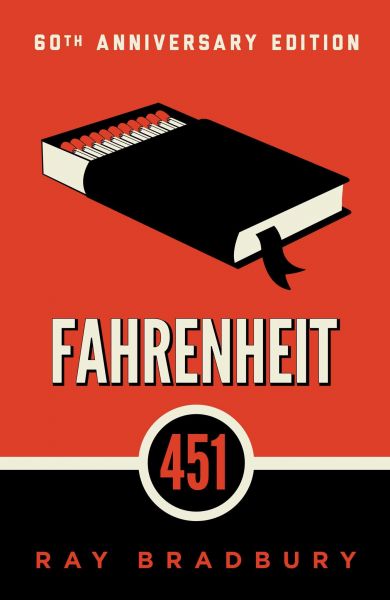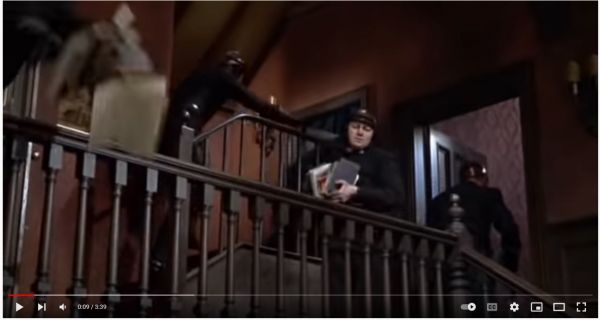The Dissident's Dictionary-Fahrenheit 451 old
Does my reader feel unease about the trends in our society? Are you skeptical about its underlying value system (or the lack thereof)? Are you looking for solid philosophical bedrock to regain your footing and provide the basis for organized dissent? If you cannot check or alter the trends, perhaps you can at least examine them for better understanding of their origins.
Look for a good piece of dissident literature—fiction, not in philosophy. I revere Hegel and Locke, but Americans need something topical and personal, and I may have the book for you: Fahrenheit 451. More than anything else, Fahrenheit protests the loss of strength in the nation's intellectual culture.
It laments the public's retreat from the jagged field of important ideas. One character says, "Films and radios, magazines, books leveled down to a sort of paste-pudding norm." He represents an arm of law-enforcement and adds, "Authors full of evil thoughts! Lock up your typewriters!" He says their writing should become "a nice blend of vanilla tapioca."
Critics describe Fahrenheit as a protest against censorship. Bradbury would say the critics did not read it closely enough. He conveys that American citizens fear important books and actually resent them intruding on the public feeling of contentment. The government employs its law-enforcement arm to burn the books, intimidate the authors, and reassure the public. It does what governments do the World over: it carries out the wishes of the public.
But books exert a strange magnetism on Fahrenheit's main character Guy Montag. Guy frets over his strangely empty life and ponders his meaningless marriage to the other main character, Mildred. Guy is so indoctrinated, he cannot detect his loss of personal values, cultural orientation, and sense of direction.
Bradbury published Fahrenheit in 1953. Just think; in 2023 Americans will celebrate its seventieth anniversary. My reader can pick up a copy of Fahrenheit for a song. It's Amazon page has received over 20,000 mostly positive comments! Schools should make it required reading, but they probably won't. It would just rankle too many people, even now.
Many Americans may start Fahrenheit 451, but it will upset them so much, they will stop dead in their tracks when they realize how well Bradbury predicts the future. He calls the first techno-toy a "Seashell," like ear-buds:
Page 10: "In her ear, the little Seashells, the thimble radio tamped tight, and the electronic ocean
of sound, of music and talk and music and talk, coming in on the shore of her unsleeping mind."
The "parlor walls," basically large, flat-screen TVs that broadcast inter-active programs 24/7:
Page 42: What was it all about? Mildred couldn't say. Who was mad at whom? Mildred didn't
quite know. What were they going to do? Well, said Mildred, wait around and see. . . .
A great thunderstorm of sound gushed from the walls. . . .
When it was all over, he felt like a man who had been thrown from a cliff, whirled in a centrifuge
and spat out over a waterfall that fell and fell into emptiness and . . . never quite touched anything.
The thunder faded. The music died.
"There," said Mildred.
And it was indeed remarkable. Something had happened. . . . and you had the impression that
someone had turned on a washing machine or sucked you up in a gigantic vacuum. You drowned
in music and pure cacophony.
Guy Montag meets a teenager named Clarisse McClellan at the beginning of the book. She goads Guy to review his life and start on a new course:
Page 9: He was not happy. He recognized this as the true state of affairs. He wore his happiness
like a mask, but (Clarisse) had run off acros the lawn with the mask, and there was no way of
asking for it back.
Page 60: What was it Clasrisse had said one afternoon? "My uncle says there used to be front
porches. And people sat there sometimes at night, talking when they wanted to talk, rocking, and
not talking when they didn't want to talk. Sometimes, they just sat there and thought about things,
turned things over. My uncle says the architects got rid of the front porches because they didn't
look well. . . . they didn't want people sitting like that, doing nothing, rocking and talking; it was
the wrong kind of social life."
Bradbury must have known that Fahrenheit would become politically incorrect. People would talk about it a lot, never comprehending its warnings; and he was right. The government does not need to censor anything. Americans would choose to stop reading on their own. They define themselves by affiliation, not by studying anything.
None of that should surprise me. Our leaders have force-fed us a tolerance-and-diversity trip for so long, most Americans count on the dominant media to define the realms of tolerance and diversity, and the dangerous relativism that lurks behind it. We have little personal sense of who we are or where they are going, anymore. The society has such weird dimensions, you can get yourself in trouble just by complaining about them.
People react weirdly to such insoluable problems. The reader learns that Guy and his wife Mildred have no children. Mildred's friend Mrs. Phelps is also childless. Put on the spot by Guy, she admits "No one in his right mind, the good Lord knows, would have children!" She frets over the fact that Guy has exposed her basic anxiety, like a drawing back, like a constriction on her personal growth and character.
Enter Captain Beatty, page 53-60:
Captain Beatty leads Guy Montag's book-burning detail and comes off as a former book-lover who over time lost faith in books, and now burns books with zeal. He visits Montag at home, suggesting that he knows Montag is hoarding books.
Page 56: "A book is a loaded gun in the house nexrt door. . . . Who knows who might be the
target of the well-read man? There was no longer need of firemen for the old purposes. They
were given the new job, as custodians of our peace of mind . . . and the rightful dread of being
inferior."
Page 54: "Now let's take up the minorities in our civilization. The bigger the population, the
more minorities. Don't step on the toes of the dog-lovers, cat-lovers . . . Mormons, Baptists . . .
Brooklynites. . . . 'The people in this book, this play, this TV serial are not meant to represent
any actual (people). . . . The bigger your market, Montag, the less you handle controversy."
Page 56: You must understand that our civilization is so vast that we can't have our minorities
upset and stirred.
Page 57: "Colored people don't like Little Black Sambo? Burn it. White people don't feel good
about Uncle Tom's Cabin? Burn it. . . . Serenity, Montag. Peace, Montag."
The society has also emasculated the character of Christianity:
Page 77: "It's been a long time. I'm not a religious man. . . ." Faber turned the pages (the Bible).
"Lord, how they've changed it in our parlors, these days. Christ is one of the 'family' now. I often
wonder if God recognizes His own son, the way we've dressed him up. He's a regular peppermint
stick now, all sugar-crystal and saccharine."
Montag escapes his life and flees into the forest, where he meets the Book People, men and women who have fled organized society and live as outcasts. Each must learn an entire book. They cannot possess books, because possession of books is against the law, but they will memorize each book, where law-enforcement cannot find it.
My reader should see that only dissidents will want to read Fahrenheit 451. They will lean on it more and more as our society dumbs down.




